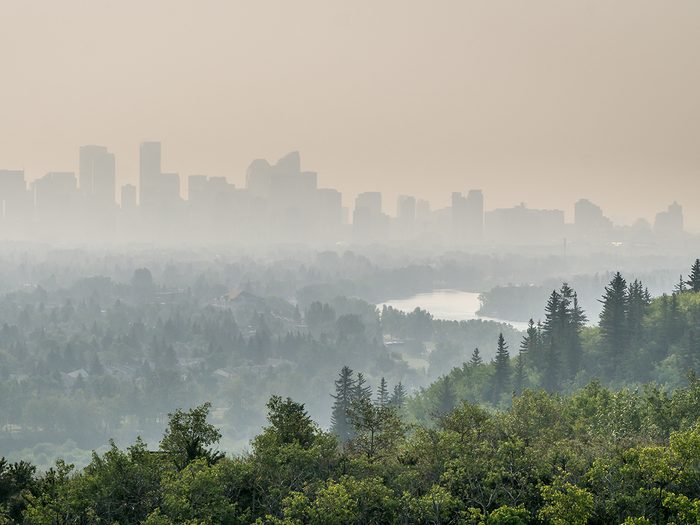How Wildfire Smoke is Affecting Your Health

...And what you can do about it.
If it feels like you’re hearing more about wildfires this year, here’s why: According to the Government of Canada, the number of wildfires across the country this summer is well above average. In particular, British Columbia is seeing double the average number of wildfires prompting the provincial government to declare a state of emergency on July 21. Likewise, the U.S. has reported over 6,000 more wildfires this year compared to the same time period in 2020.
With the increasing number of wildfires comes an increase in the amount of wildfire smoke, stoking concerns about air quality.
Wildfire smoke consists of toxic air pollutants in the form of fine particles. These particles can seep into our lungs and bloodstream and can lead to serious health issues. Even people who aren’t close to a wildfire can be affected by wildfire smoke. For instance, fires in Northern Ontario sparked air quality warnings in Southern Ontario cities, including Toronto and Hamilton.
“You do not need to be able to see or smell smoke to have potential health effects from it,” says Dr. Sarah Henderson, associate professor at University of British Columbia’s School of Population and Public Health. “Those fine particles make a lot of impact to air quality before you can actually see them in the air.” Wildfire smoke spreads far, which means people thousands of kilometres away from a fire can be impacted, says Henderson.
This summer, Environment Canada has issued air quality advisories for cities from New Brunswick to British Columbia—and with the fires still burning, these issues are expected to continue. We caught up with Henderson to find out how we should protect ourselves.
Pollution is all around us—is wildfire smoke that much worse? How can it affect our health?
“This form of air pollution is different from the kind of pollution that comes from cars or industries,” says Henderson. “It has fine particulate matter, and the problem with that is when you breathe, the particles can be inhaled very deep into your lungs.” This can trigger your body to have an immunological response, she explains. “They’re a foreign invader—the way a bacterium or virus would be—and your body tries to get rid of them in the same way.” Since our immune system isn’t able to neutralize its response to wildfire smoke like it may be able to do with a virus, it can put the body into a state of inflammation.
Are certain people more vulnerable to the health effects of wildfire smoke?
Wildfire smoke is particularly concerning for people who have pre-existing respiratory conditions, especially asthma or chronic obstructive pulmonary disease (COPD). But anyone whose health is compromised by a chronic condition (including heart disease, lung disease and diabetes) will be at a higher risk of experiencing health effects. “We’re also concerned about people who are pregnant, infants, and small children whose lungs are still developing,” says Henderson. “ Also, older adults, since lung capacity decreases with age, and anybody who has an acute respiratory infection, like COVID or influenza.”
What are some of the most common health effects of wildfire smoke?
“For most people, the effects will be transient,” says Henderson. And if you don’t have a condition such as asthma or COPD, you may not feel any symptoms.
For some people, wildfire smoke can cause eye irritation, a runny nose (also known as rhinorrhea), sore throat, a mild cough, headaches and an increase in phlegm, according to the B.C. Centre of Disease Control.
People who have a respiratory condition may find their airways closing up, causing them to have difficulty breathing, says Henderson. Furthermore, “people who have heart disease might feel heart palpitations, and people who have diabetes may have difficulty getting their insulin balance.”
Should I check the air quality index before leaving the house?
Henderson encourages people to use the AQHI (The Air Quality Health Index) smartphone app, which tells users whether or not wildfire smoke is around them. “AQHI is an index that goes from one to 10, and for every value of the index, there’s advice,” says Henderson. “When air quality gets quite poor, we would recommend people limit their time outdoors and limit their exertion outdoors—the more you breathe, the more smoke you inhale.” This means you’ll want to avoid high-intensity outdoor workouts, in particular.
Are face masks effective against wildfire smoke?
“If people feel they need masks for respiratory protection, the best one they can wear is a particle respirator, which is an N95 or KN95,” says Henderson. “Those work really well for removing small particles out of the inhaled air, as long as the air goes through the material of the mask and not around—the mask has to be well-fitted to the face.” Henderson warns particle respirators can make it harder to breathe, and they can be uncomfortable, so you’ll want to avoid having to wear one for a long period of time.
How else can we protect ourselves?
Whether we’re working from home or lounging on the couch, most of us spend ample time indoors, so it’s important to keep our indoor environments as smoke-free as possible. “That means closing doors and windows if it’s safe to do so without getting too hot and, if you have the resources to do so, having a portable air cleaner,” says Henderson. “If there’s one thing you can do to protect your health, it’s getting a portable air cleaner and using it.”
Henderson prefers the term “air cleaner” over “air purifier.” (“What does ‘pure air’ even mean?” she asks.) Henderson offers tips for selecting the right product for your home: “Look for one that uses a heat pump filtration—not ozonation, which puts more ozone into the air and doesn’t do anything to remove the particles from the air,” says Henderson. She recommends getting an air cleaner with HIPAA filtration and being careful to select one that is the correct size for the room(s) you want to use it in.
How long does wildfire smoke last in the air?
“It really depends on the fires and the weather,” says Henderson. When fires continue to burn, smoke can last for weeks or months. “If a really smoky fire was suddenly extinguished, the smoke would likely be fully dispersed by light winds within 24 to 48 hours—faster if the wind was strong or if it was raining.”
Any tips for staying healthy during wildfire season?
“My biggest tip is to listen to your body,” says Henderson. Some people are more sensitive to smoke than others, she says, so it’s important to listen to the signals.
“If you have a headache, if your breathing feels funny, respect what your body’s telling you and take it easy,” says Henderson. “Take measures to protect yourself and drink lots of water to help reduce that inflammation.” (Here are seven times you need to drink more water than usual.)
While wildfire smoke is a serious potential health risk, Henderson also cautions that there’s no reason to panic. “If you take some simple measures to protect yourself, you should be OK for the most part.”
Are there any long-term side effects of smoke inhalation?
Henderson says researchers are still trying to answer that question. “The thing I always tell people is if you protect yourself from inhaling smoke in the short term, you’re going to protect yourself from any potential long-term health effects that we might discover five or 10 years from now,” she says. “The key message is: Try to reduce your exposure.”
Next, read up on the worst forest fire in Canadian history.






